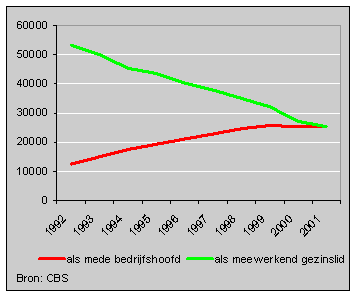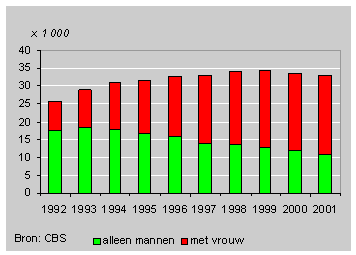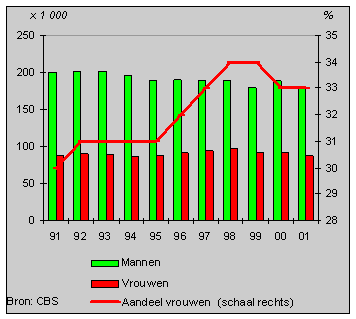More women farm heads

Women farmers are more often co-heads of the farms they work on. In 1992 just over twelve thousand family farms were partly headed by women. By 2001 this had risen to more than 25 thousand. This means that one quarter of all farms in the Netherlands are partly headed by a woman: a total of more than 26 thousand woman are head or co-head of an agricultural business.
Family farms with women farmers

In about sixty percent of family businesses in the agricultural sector farmers’ wives work on their husbands’ farms. Last year was the first time that more women worked as a head of the business than as a worker on the farm.
Man-woman partnerships
The number of farms managed by more than one person increased in the nineties, partly because of the increasing popularity of male-female management partnerships. This business form has a number of tax advantages compared with businesses headed by one person; profits can be shared, for example. The strong increase in the number of man-woman partnerships has led to a substantial reduction in the number of ‘ordinary’ working farmers’ wives.
The number of all-male management partnerships on family farms (mostly father and son) has declined considerably in recent years. In 1992 about eighteen thousand farms were headed by two or more men, in 2001 this had dropped to under eleven thousand.
Family farms with more than one head

Women in agriculture
The number of women working in the agricultural sector remained quite constant between 1992 and 2001, at around 90 thousand. The volume of female labour was around 55 thousand, in this period. The volume of male labour decreased by twenty thousand.
Agricultural labour force

This means that women account for one third of the total number of workers in agriculture. About sixty percent of these women are members of the farm household. Roughly speaking just over half of these are also head of the business; the remainder are wives who work for the farm. Most of the remaining forty percent work part-time, mainly earning their money in horticulture.
Cor Pierik